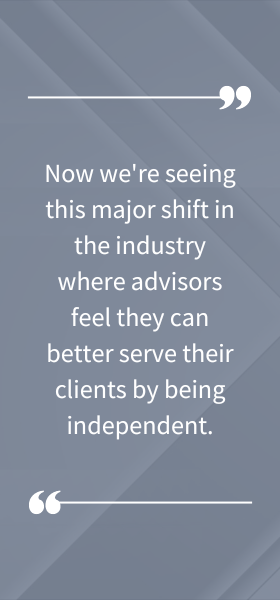Since founding R. J. Schrift Private Asset Management in 2012, Ryan Schrift has grown his practice from $10M to more than $150M in managed assets with $30M+ in organic growth since January 2022 alone. Servicing clients in 26 states, he has successfully grown his firm by diversifying his business development strategies, including organic growth, acquisition, and targeting clients through niche specialization.
In a conversation with IAA from his office in Belmont, NC, Ryan talks about what to consider before making an acquisition, different ways to establish a niche client base, and how he measures success.
What made you want to work in the financial services industry, specifically as a financial advisor?
It’s pretty much all I’ve wanted to do since I was a little kid. I found the financial and stock markets intriguing, and I thought there was always a way to help people make money. My Dad, who worked for Verizon, would come home from work and ask me every day what the stock price for Verizon was, so I ended up watching financial news on tv from when I was about 12 through high school. I bounced around in college with accounting and different industries with internships and landed with Raymond James my senior year. From there, I just knew what I wanted to do.
I genuinely want everyone to be financially successful. It’s fun for me to watch people make money, make good decisions, and leverage our resources so that they’re in a better position.
When you decided to go independent, was there one motivating factor?

As I got further into the business, I wanted to be able to create my own offerings, processes, and structures. All that stuff is provided for you at larger firms, which is a positive for some, but I wanted to do things differently. I wanted the autonomy of being independent, so I could build out my processes, marketing, brand, and reputation to make it more the way I wanted to do it vs. representing someone else’s thoughts.
When I went independent, the industry looked at it as the place advisors went to die. But I’ve proven that this couldn’t be further from the truth. Now we’re seeing this major shift in the industry where advisors feel they can better serve their clients by being independent.
Does it give you peace of mind to know that you are in control of your brand?
It does. I’d rather fail with my decisions than win with somebody else’s. I know nobody else cares about my business more than I do. I feel comfortable knowing I’m the final and ultimate decision-maker.
How have your clients benefitted from your move? With financial advisors offering similar services, differentiating yourself can be vital in recruiting new clients. As the saying goes, “the riches are in the niches.” How have you made this strategy work for you?
I’ve always been a big proponent of serving a niche client base. It’s the most powerful form of marketing because they market for you.
You must have an entry point when you’re trying to build a niche. My first niche was Verizon employees because my Dad worked for Verizon. The next niche was pilots because my older brother is a pilot. It’s essential to be able to relate to them. I tried dentists and failed miserably. I didn’t know anything about dentists and didn’t enjoy it. I’ve grown up in small airplanes, so I know the lingo, how their schedules work, etc. So over time, I became an expert. If a pilot slips off an airplane in Chicago and gets hurt, do they file disability in Illinois where it happened, in Ohio where the airline is based, or in Pennsylvania where the pilot lives? It makes a huge difference. We produce content quarterly for one airline, and people subscribe to it. It took a while to get it going, but once it starts clicking it goes pretty fast.
What advice would you give advisors who want to carve out a client niche to differentiate themselves but don’t know where to begin?
They should look at their book of business, write down their top 20 or 30 clients, and see if those clients have a few things in common. Maybe you have a few doctors or people who work for the same company, or it’s three people you go to church with. A niche can be geographical, an industry, a profession, or a company. Then I would run through some qualifiers like; Are they affluent? Do you like to work with them? Is there a lot of them? You already have your point of entry because you’re working with a couple of them. Then it’s important to sit down with those clients and ask them if they think it’s a good idea before you put too much money and time into it.
If you’re starting out and don’t have an existing book of business, use the qualifiers to pick three. You want to work with a group of people who have money or a group with a lot of people, like a union or some type of connection/affinity group. Then go after a couple of niche markets simultaneously to see which ones stick.
You‘ve also grown your firm through acquisition. How did you determine you were ready to take that step?
My opportunities were strategic; they weren’t a forced or random situation. I had developed relationships with these folks. But our biggest skill set here in the office is operations. We have a lot of processes and checklists. Once we put those into place, it freed us up and added a level of scalability to the firm that gave me the time to work on acquisitions.
You need to have your ducks in a row to acquire a firm successfully and for someone else to want you to take over their business. Have a business plan for how you run your operations at your firm and what your staff does, everything from how you onboard clients to your marketing plan.
Have your professionalism buttoned up. You need to show your ability to bring on additional clients where you can service them to the level the selling firm would want. And if you can’t do that, don’t tell someone you can. Also, make sure you qualify yourself monetarily ahead of time.
You have two children, own your own firm, and are an active community member. How do you manage your work-life balance?
Work-life balance is a priority for me. When my first son was born, I put all the processes and procedures in place so things wouldn’t fall through the cracks, and I could be super-efficient and be done earlier in the day. I re-prioritized and reset the tone of communication and haven’t had work email on my phone since my son was born more than six years ago. I didn’t feel like getting emails on my phone at night or over the weekend mattered. Technology has been a positive for me because I use it to leverage my time, but I don’t let it control my days. Thanks to the flexibility of our business, I can go to all the recitals, sporting events, or school parades during the day. It’s a family-first atmosphere here, so this goes for everyone. If my staff have things to do, they go do them. Flexibility is how I’ve always measured success.
What do you like to do in your spare time?
I’m an activity person; I’d rather do something than watch tv. I take my kids to the playground and go to their soccer games. I like live music, comedy shows, and going to a Hornets game. I like to hike. That’s probably my favorite thing to do. I also have a huge family, so I spend time with them.
To learn more about Ryan and his practice, visit his website or follow him on LinkedIn

*This conversation has been edited for length and clarity.
Check out more of our Advisor Spotlights here.

